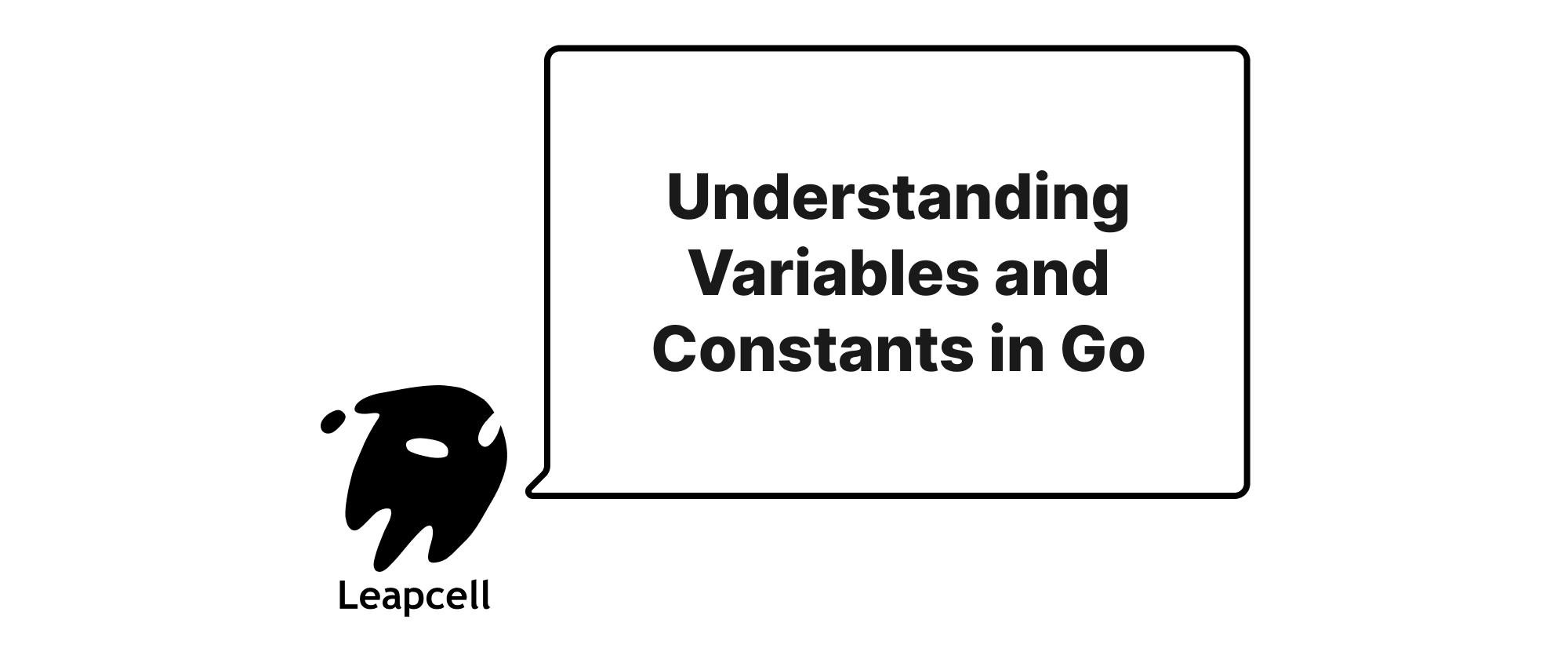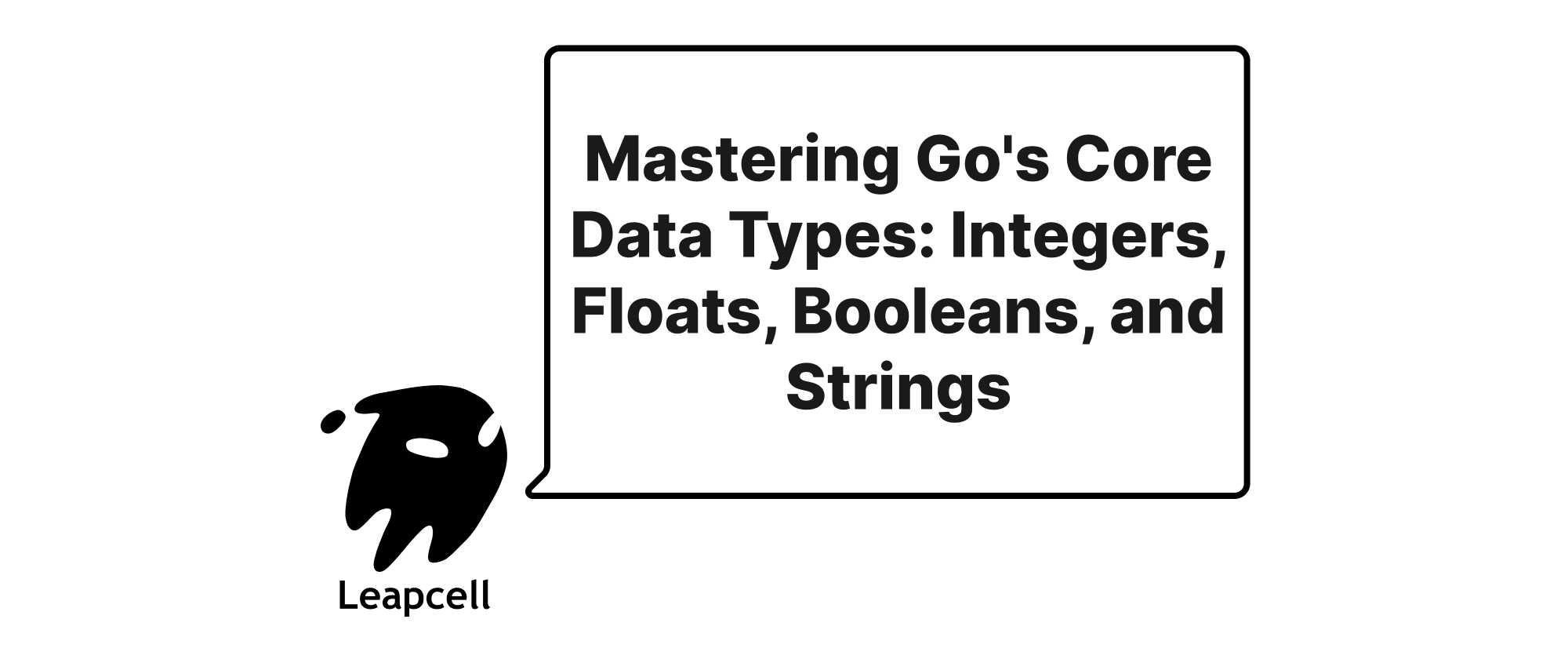Understanding Variables and Constants in Go - Declaration, Initialization, and Scope
Min-jun Kim
Dev Intern · Leapcell

Go's simplicity and efficiency are partly attributed to its straightforward approach to variable and constant handling. Unlike some other languages, Go emphasizes clarity and explicit declaration, minimizing ambiguities. This article delves into the core concepts of variable and constant declaration, initialization, and their crucial aspect – scope, within the Go programming language.
Variables: The Mutable Data Containers
Variables are named storage locations that hold data, and their values can change during the program's execution. In Go, every variable must have a type, which determines the kind of data it can store and the operations that can be performed on it.
Variable Declaration
Go provides several ways to declare variables, each with its own use case.
1. Explicit Declaration with var Keyword
The most verbose way to declare a variable is by using the var keyword, followed by the variable name and its type.
package main import "fmt" func main() { var age int // Declares an integer variable named 'age' var name string // Declares a string variable named 'name' var isGoProgram bool // Declares a boolean variable named 'isGoProgram' fmt.Println("Default age:", age) fmt.Println("Default name:", name) fmt.Println("Default isGoProgram:", isGoProgram) }
Observation: When a variable is declared using var without explicit initialization, Go automatically assigns a "zero value" to it.
int:0string:""(empty string)bool:false- Pointers:
nil - Slices, maps, channels:
nil
2. Explicit Declaration with Initialization
You can initialize a variable directly during its declaration using the = operator.
package main import "fmt" func main() { var count int = 10 // Declares and initializes 'count' to 10 var message string = "Hello, Go!" // Declares and initializes 'message' fmt.Println("Count:", count) fmt.Println("Message:", message) }
In this case, the zero value is not used as the variable is immediately assigned a specific value.
3. Type Inference with var
Go's strong type system doesn't always require you to explicitly state the type if it can be inferred from the initial value.
package main import "fmt" func main() { var price = 99.99 // Go infers 'price' is of type float64 var city = "New York" // Go infers 'city' is of type string var pi = 3.14159 // Go infers 'pi' is of type float64 fmt.Printf("Price: %f (Type: %T)\n", price, price) fmt.Printf("City: %s (Type: %T)\n", city, city) fmt.Printf("Pi: %f (Type: %T)\n", pi, pi) }
Here, Go infers price and pi as float64 because floating-point literals in Go are float64 by default. Similarly, string literals are string.
4. Short Variable Declaration (:=)
This is the most common way to declare and initialize variables within functions in Go. The := operator is a shorthand for declaration and initialization, and it only works inside functions. It cannot be used at the package level.
package main import "fmt" func main() { // Short variable declaration score := 100 // Go infers 'score' as int isValid := true // Go infers 'isValid' as bool greeting := "Welcome!" // Go infers 'greeting' as string // You can declare multiple variables in a single line x, y := 1, 2.5 // x is int, y is float64 name, age := "Alice", 30 // name is string, age is int fmt.Println("Score:", score) fmt.Println("IsValid:", isValid) fmt.Println("Greeting:", greeting) fmt.Println("X:", x, "Y:", y) fmt.Println("Name:", name, "Age:", age) // Redeclaration is not allowed in the same scope, unless there's a new variable // greeting := "Hello" // ERROR: No new variables on left side of := // But this is allowed if 'error' is a new variable // Here, err is declared for the first time file, err := openFile("example.txt") if err != nil { fmt.Println("Error opening file:", err) } else { fmt.Println("File opened:", file) } // This is also allowed. Existing 'err' variable is reassigned, and 'data' is new. data, err := readFile(file) if err != nil { fmt.Println("Error reading file:", err) } else { fmt.Println("File data:", data) } } // Dummy functions to illustrate := with multiple return values func openFile(filename string) (string, error) { if filename == "example.txt" { return "file handle", nil } return "", fmt.Errorf("file not found") } func readFile(handle string) (string, error) { if handle == "file handle" { return "some content", nil } return "", fmt.Errorf("invalid handle") }
The := operator is incredibly convenient for local variable declaration. It simplifies code and relies on Go's excellent type inference.
Variable Reassignment
Once declared, the value of a variable can be changed (reassigned) using the = operator.
package main import "fmt" func main() { count := 5 fmt.Println("Initial count:", count) count = 10 // Reassigning the value of 'count' fmt.Println("New count:", count) // Different type assignment is not allowed // count = "hello" // ERROR: cannot use "hello" (type string) as type int in assignment }
Unused Variables
Go is strict about unused variables. Declaring a variable and not using it will result in a compile-time error. This helps maintain clean code and prevents logical errors.
package main func main() { // var unusedVar int // ERROR: unusedVar declared and not used // _ = unusedVar // This line would prevent the error by "using" the variable }
The blank identifier _ can be used to explicitly discard a value, often useful when a function returns multiple values but you only need some of them.
Constants: The Immutable Data Holders
Constants are similar to variables in that they hold values, but their values are fixed at compile time and cannot be changed during program execution. They are typically used for values that are known in advance and do not vary, like mathematical constants or configuration values.
Constant Declaration
Constants in Go are declared using the const keyword.
package main import "fmt" func main() { const Pi = 3.14159 // Declares a float64 constant const MaxUsers = 100 // Declares an int constant const Greeting = "Hello, World!" // Declares a string constant fmt.Println("Pi:", Pi) fmt.Println("Max Users:", MaxUsers) fmt.Println("Greeting:", Greeting) // Pi = 3.0 // ERROR: cannot assign to Pi (constant) }
Similar to variables, constants can also leverage type inference. If a type is not specified, Go will infer it from the value.
package main import "fmt" func main() { const E = 2.71828 // Inferred as float64 const Version = "1.0.0" // Inferred as string fmt.Printf("E: %f (Type: %T)\n", E, E) fmt.Printf("Version: %s (Type: %T)\n", Version, Version) }
Untyped Constants
A unique feature of Go constants is that they can be "untyped." This means a numeric constant doesn't initially have a fixed type (like int, float64, etc.) until it's used in a context that requires a specific type. This allows for more flexible use of constants.
package main import "fmt" func main() { const LargeNum = 1_000_000_000_000 // Untyped integer constant const PiValue = 3.1415926535 // Untyped floating-point constant var i int = LargeNum // LargeNum is implicitly converted to int var f float64 = LargeNum // LargeNum is implicitly converted to float64 var complexVal complex128 = PiValue // PiValue is implicitly converted to complex128 fmt.Printf("i: %d (Type: %T)\n", i, i) fmt.Printf("f: %f (Type: %T)\n", f, f) fmt.Printf("complexVal: %v (Type: %T)\n", complexVal, complexVal) // This flexibility is powerful. Imagine if LargeNum was typed as int64 directly: // var smallInt int = LargeNum // Would be a compile-time error if LargeNum was int64 and bigger than int }
Untyped constants offer convenience by allowing them to be used in various numeric contexts without explicit type conversions, as long as the value fits the target type.
iota for Enumerated Constants
iota is a pre-declared identifier that acts as a simple counter, incrementing by one each time it is used in a const declaration. It's particularly useful for creating sequences of related constants (enums).
package main import "fmt" func main() { const ( // iota starts at 0 Red = iota // Red = 0 Green // Green = 1 (implicitly = iota) Blue // Blue = 2 (implicitly = iota) ) const ( // iota resets to 0 for each new const block Monday = iota + 1 // Monday = 1 Tuesday // Tuesday = 2 Wednesday // Wednesday = 3 Thursday Friday Saturday Sunday ) const ( _ = iota // _ discards the 0 value KB = 1 << (10 * iota) // KB = 1 << 10 (1024) MB // MB = 1 << 20 GB // GB = 1 << 30 TB // TB = 1 << 40 ) fmt.Println("Red:", Red, "Green:", Green, "Blue:", Blue) fmt.Println("Mon:", Monday, "Tue:", Tuesday, "Wed:", Wednesday) fmt.Println("KB:", KB, "MB:", MB, "GB:", GB, "TB:", TB) }
iota provides a concise and readable way to declare sets of incrementing constants, often used for bit flags, error codes, or days of the week.
Scope: Where Variables and Constants are Visible
Scope defines the region of a program where a declared identifier (like a variable or constant) can be accessed. Understanding scope is critical for preventing naming conflicts and managing the lifetime of data. Go has two primary scopes: package scope and block scope.
1. Package Scope (Global Scope)
Identifiers declared at the package level (outside any function, method, or struct) have package scope. They are visible throughout all files within the same package.
- Exported Identifiers: If a variable or constant name starts with an uppercase letter, it is "exported." This means it can be accessed from other packages as well.
- Unexported Identifiers: If it starts with a lowercase letter, it is "unexported" (package-private) and is only accessible within the package where it is declared.
package main // This is a package declaration import "fmt" // Package-level variables/constants var PackageVar int = 100 // Exported (starts with uppercase) const PackageConst string = "I'm a package constant" // Exported var packagePrivateVar string = "I'm only visible in main package" // Unexported func main() { fmt.Println("Accessing package-scoped variables:") fmt.Println("PackageVar:", PackageVar) fmt.Println("PackageConst:", PackageConst) fmt.Println("PackagePrivateVar:", packagePrivateVar) anotherFunction() } func anotherFunction() { fmt.Println("\nAccessing package-scoped variables from another function:") fmt.Println("PackageVar (from anotherFunction):", PackageVar) fmt.Println("PackageConst (from anotherFunction):", PackageConst) fmt.Println("PackagePrivateVar (from anotherFunction):", packagePrivateVar) }
2. Block Scope (Local Scope)
Identifiers declared inside a function, method, if statement, for loop, switch statement, or any curly braces {} have block scope. They are only visible and accessible within that specific block and its nested blocks.
package main import "fmt" var packageVar = "I'm defined at package level" func main() { // Variable declared in main function's block scope var functionScopedVar = "I'm visible only within main function" const functionScopedConst = "I'm also visible only within main function" fmt.Println(packageVar) fmt.Println(functionScopedVar) fmt.Println(functionScopedConst) if true { // Variable declared in if block's scope blockScopedVar := "I'm visible only within this if block" fmt.Println(blockScopedVar) // Redeclaring a variable with the same name in an inner scope // This is called "shadowing" functionScopedVar := "I'm a new variable, shadowing the outer one" fmt.Println("Inner functionScopedVar:", functionScopedVar) // Prints the shadowed one } // fmt.Println(blockScopedVar) // ERROR: undefined: blockScopedVar (out of scope) // Accessing the outer functionScopedVar after the inner block fmt.Println("Outer functionScopedVar:", functionScopedVar) // Prints the original one for i := 0; i < 2; i++ { // 'i' has scope only within this for loop loopVar := "I'm visible only within this loop iteration" fmt.Println("Loop iteration:", i, loopVar) } // fmt.Println(i) // ERROR: undefined: i (out of scope) // fmt.Println(loopVar) // ERROR: undefined: loopVar (out of scope) }
Key Points about Block Scope and Shadowing:
- Visibility: An identifier is visible from its declaration point to the end of the block in which it's declared.
- Shadowing: If an inner scope declares an identifier with the same name as an identifier in an outer scope, the inner declaration "shadows" the outer one. Within the inner scope, the inner identifier is accessed. The outer identifier still exists but is temporarily inaccessible. Once the inner scope ends, the outer identifier becomes accessible again. While technically allowed, excessive shadowing can make code harder to read and debug, so it should be used judiciously.
Lifetime vs. Scope
It's important to differentiate between an identifier's scope and a variable's lifetime.
- Scope is a compile-time concept that dictates where an identifier can be referenced.
- Lifetime is a runtime concept that dictates how long the memory allocated for a variable exists.
Go's garbage collector manages the lifetime of variables. A variable lives as long as it is reachable by the program, regardless of its scope. If a variable's value is needed after its scope ends (e.g., if a pointer to it is returned from a function), Go's escape analysis will determine that it needs to be allocated on the heap, ensuring its lifetime extends beyond its immediate block. Conversely, if a variable is no longer referenced, even if technically in scope, it may be garbage collected.
Conclusion
Understanding how to declare, initialize, and manage the scope of variables and constants is fundamental to writing effective Go programs. Go's design choices, such as explicit declarations, strong type inference with :=, the usefulness of iota for constants, and strict rules around variable usage and scope, contribute to its readability, maintainability, and concurrency safety. Mastering these concepts will enable you to write clean, efficient, and idiomatic Go code.


